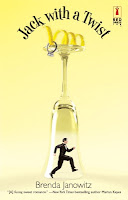Hi, my name’s April Henry, and I have a split personality. On the one hand, I have written seven books for adults, with five more under contract. (My latest, co-written with Lis Wiehl, is Hand of Fate.) On the other hand, I have written three books for teens (also known as young adults, or YAs), with two more coming down the pike. (My latest, Girl, Stolen, comes out September 28).
So what’s it like to write for two completely different audiences? And are they really so different?
Writing
Kids
- POV (point of view) characters must almost always be kids.
- There usually can only be one POV character, and it must be clear who it is.
- Parents cannot save the day – teens must. Which is why you will so often find kids who are orphans or who have non-functioning or generally absent parents.
- YAs are usually more focused on character and voice than plot. YA literature deals with developmental and emotional issues that are unique to the experience of being a teen.
- YA lit has great built-in obstacles: falling in love for the first time, coming of age, prom, homecoming, cliques, finding out who you are, peer pressure, family dynamics, dealing with parents’ divorce, etc.
- If a YA book isn’t in first person, there had better be a really good reason.
- Books usually cover a shorter time frame – no longer than a year.
- Books are typically much shorter- 50,000 words is common, vs. say, 80,000 to 90,000 for adults
- It’s okay to have sex, but it may limit how much schools support you or the age group you can appeal to in hardcover (when kids don’t usually buy their own books).
- Graphic violence may even be a harder sell.
- Usually, for a YA book to be successful the author can't get carried away with poetic writing, lengthy descriptions, etc. that adults might actually enjoy.
- An “issue-oriented” book, like a book about being a teen-aged father or having leukemia, may garner a lot of librarian support. And librarian support is key to success in the YA world.
Adults
- Pretty much anything goes.
Fans
Kids
- Your readership changes every few years as the readers grow up. They often read your books only for a brief time period, say middle school, then move on to adult books. That makes it harder to develop a following. (Of course, some authors, like JK Rowling and Suzanne Collins, have attracted both adult and teen fans).
- At the same time, if you have a lot of books out there, kids will devour them and not care if they were published this year or five years ago.
- Teens have big emotions about everything, and writers are no exception. They will pour out their stories to you, friend you on Facebook (and think you are really friends), ask you to sign their hands, and nervously hand you poems they wrote and ask what you think.
- Kids will ask what adults secretly want to know “How much do you make?”
Adults
- When you write for adults, each book can increase your readership. If readers like your work, they will buy all future your books and it builds on itself. A fan may stick with you for thirty years.
- When adults show up at a signing, a certain percentage only want your signature, because they see your book as collectible.
- Adults are often cool and dispassionate.
Measuring success
Kids
- There are many more professional review publications, like VOYA and Hornbook (and many fewer consumer outlets).
- Reviews trickle in for up to six months after the book is published.
- There are so many more opportunities for promotion in kidlit/YA - libraries, schools, conferences, etc - opportunities that aren't necessarily available to writers of adult books.
- You may be given a much longer timer time to make an impact on the market.
- It’s not unheard of for a picture book to be in print for 15 or more years.
- Your book might get bought for a bookclub or bookfair.
- Your book might be named to one of the important library lists a year after publication (such as any YALSA list like Quick Picks for Reluctant Readers, or New York Public Library’s Books for the Teen Age).
- And it might be named to a state list even years later (resulting in sales to most of the state's school libraries).
- Adults might still ask you, "So when are you going to write a real [ie, for adults] book?"
Adults
- Reviews usually come in right away for adult books.
- You have 6-8 weeks to show success in hardcover.
- Then your books are often returned by bookstores for credit and the new hard covers take their place.



























